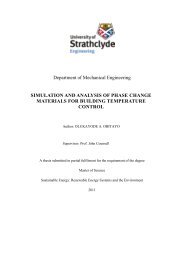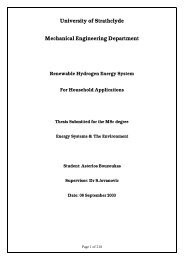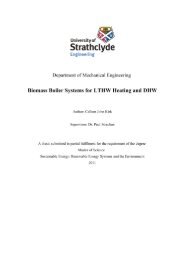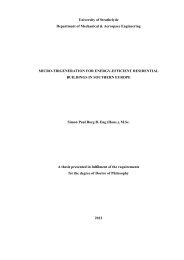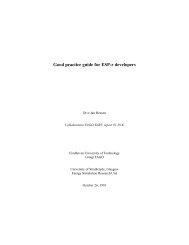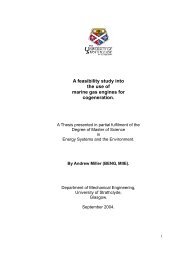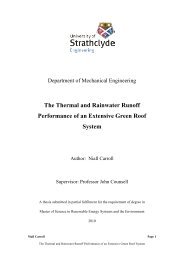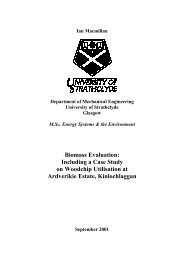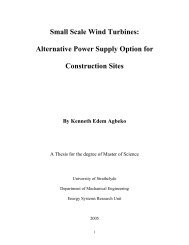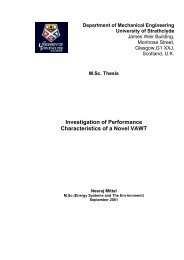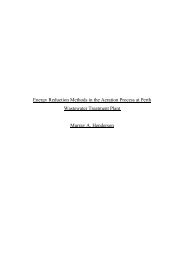- Page 1 and 2:
Decision Support for New and Renewa
- Page 3 and 4:
Abstract The global requirement for
- Page 5 and 6:
CONTENTS 1 ENERGY SYSTEMS FOR SUSTA
- Page 7 and 8:
5.5 Steam Turbine Model 149 5.6 Fue
- Page 9 and 10:
FIGURES Figure 1.1 Final Energy Con
- Page 11 and 12:
Figure 7.30 Following Electricity a
- Page 13 and 14:
on the use of fossil fuels, energy
- Page 15 and 16:
The general increase in energy cons
- Page 17 and 18:
supply is reduced or eliminated, lo
- Page 19 and 20:
Figure 1.3 The Electricity Supply G
- Page 21 and 22:
on different generation mixes depen
- Page 23 and 24:
Various studies have been carried o
- Page 25 and 26:
provision for smaller areas, and he
- Page 27 and 28:
1.7 References [1] The Internationa
- Page 29 and 30:
2 Options for New and Renewable Ene
- Page 31 and 32:
the amount of usable heat that is g
- Page 33 and 34:
the conversion of petrol cars; howe
- Page 35 and 36:
set times, producing a constant ele
- Page 37 and 38:
partial load. Fast response and sta
- Page 39 and 40:
2.3 The Production and Storage of H
- Page 41 and 42:
dedicated boiler, which runs contin
- Page 43 and 44:
Figure 2.3 A Typical Hydrogen Filli
- Page 45 and 46:
part of the natural carbon cycle (a
- Page 47 and 48:
Figure 2.4 Layout of a Gasification
- Page 49 and 50:
met by process integration and the
- Page 51 and 52:
Figure 2.5 The Inputs and Outputs o
- Page 53 and 54:
1. Scale for measuring out lye and
- Page 55 and 56:
feedstock being used. Sugary feedst
- Page 57 and 58:
carbon dioxide via steam reforming.
- Page 59 and 60:
• Where CHP is used, the balance
- Page 61 and 62:
[22] Vehicle Certification Agency (
- Page 63 and 64:
[55] M. A. Paisley, J. M. Irving, R
- Page 65 and 66:
3 Approaches to Renewable Energy Sy
- Page 67 and 68:
Because of the intermittent nature
- Page 69 and 70:
A renewable energy supply evaluatio
- Page 71 and 72:
the system are kept. The output of
- Page 73 and 74:
There are various models available
- Page 75 and 76:
When the use of climate dependant i
- Page 77 and 78:
3.5 References [1] M. Muselli, G. N
- Page 79 and 80:
4 A Procedure for Demand and Supply
- Page 81 and 82:
pumped storage and flywheels), a ba
- Page 83 and 84:
for the agricultural vehicle use re
- Page 85 and 86:
Figure 4.4 Combining Demands to Tak
- Page 87 and 88:
ates for vehicles, engines and othe
- Page 89 and 90:
Figure 4.5 Derived Fuel Production
- Page 91 and 92:
together if desired, and taken forw
- Page 93 and 94:
profiles are output from this part
- Page 95 and 96:
dividing the production rate at eac
- Page 97 and 98:
As it would be too confusing to sho
- Page 99 and 100:
Figure 4.12 Output of the Matching
- Page 101 and 102:
However, when more than one transpo
- Page 103 and 104:
considered, this amount is added to
- Page 105 and 106:
users are alerted if there is not e
- Page 107 and 108:
at the matching stage, along with t
- Page 109 and 110:
vehicles if they are increased by 1
- Page 111 and 112:
If biogas is being considered, the
- Page 113 and 114:
The number of timesteps per hour wi
- Page 115 and 116:
After the algorithm has been follow
- Page 117 and 118:
• Float Charge - once the battery
- Page 119 and 120:
Discharge No tank = tank fuel used
- Page 121 and 122:
equired (kW) = maxkWh x bulk% (5.16
- Page 123 and 124:
An example of the output graph prod
- Page 125 and 126:
5.2.1 Required Power Specifically d
- Page 127 and 128:
5.2.3 Engine Performance in the Con
- Page 129 and 130:
used for gas powered ICEs, but the
- Page 131 and 132:
and five times, depending on the nu
- Page 133 and 134:
Is PL < Min ? No Is PL = 0 ? No Is
- Page 135 and 136:
where Max = maximum energy availabl
- Page 137 and 138:
where Ratiopart = heat to electrici
- Page 139 and 140:
(including following heat demand wh
- Page 141 and 142:
where SFC = specific fuel consumpti
- Page 143 and 144:
engines running respectively). If t
- Page 145 and 146:
(continued) Is Fuel Available > (4
- Page 147 and 148:
of the definition window for a Stir
- Page 149 and 150:
and continuous operation. Again, mu
- Page 151 and 152:
The performance of a fuel cell is n
- Page 153 and 154:
percentage loading, rather than usi
- Page 155 and 156:
Is Min = 0 ? No Is Min = PC1 ? No I
- Page 157 and 158:
5.6.4 If Fuel Availability is Less
- Page 159 and 160:
5.7 Electrolyser Model An electroly
- Page 161 and 162:
original calculation of the amount
- Page 163 and 164:
5.8 Regenerative Fuel Cell Model A
- Page 165 and 166:
following the heat demand. To follo
- Page 167 and 168:
C:\ My Documents\ Nic\ Thesis\ Old\
- Page 169 and 170:
As 1 kWh = 3610.3 kJ, and using lit
- Page 171 and 172:
Add Heat to Water Storage Tank Usin
- Page 173 and 174:
Use Stored Hot Water to Supply Heat
- Page 175 and 176:
information is given about the over
- Page 177 and 178:
[23] K. Foger, B. Godfrey, “Syste
- Page 179 and 180:
the gasification and pyrolysis defi
- Page 181 and 182:
eing used each day for a continuous
- Page 183 and 184:
Where Biogas = Biogas production ra
- Page 185 and 186:
6.1.3 Use of Biogas Various options
- Page 187 and 188:
The amount of hydrogen that can be
- Page 189 and 190:
direct proportion, and the weight o
- Page 191 and 192:
produce in total (Nm 3 per tonne fe
- Page 193 and 194:
Electricity (kW) = Elec x Feed (6.1
- Page 195 and 196:
3. Make hydrogen via steam reformin
- Page 197 and 198:
Where Methane = Methane Production
- Page 199 and 200: (continued) Keep as medium heating
- Page 201 and 202: Yes Feed1 = Yield1 x Land1 / No. of
- Page 203 and 204: production and energy use profiles
- Page 205 and 206: If it is the last timestep of the p
- Page 207 and 208: For each process, the process chara
- Page 209 and 210: At the end of the simulation, graph
- Page 211 and 212: As the time required for one batch
- Page 213 and 214: Ethanol = Factor1 x Eth x Timesteps
- Page 215 and 216: 6.5 Electrolysis As it is sometimes
- Page 217 and 218: 6.7 Landfill Gas Processing As the
- Page 219 and 220: Demand Profile Design & Profile Dat
- Page 221 and 222: Figure 7.2 Degree-Days Versus Month
- Page 223 and 224: Stage 1 - Sustainable Fuel Supply S
- Page 225 and 226: The different profile of use graphs
- Page 227 and 228: Figure 7.3 Fermentation System Inpu
- Page 229 and 230: Figure 7.7 Fermentation System Info
- Page 231 and 232: Figure 7.10 Fermentation System Out
- Page 233 and 234: The output obtained when a second h
- Page 235 and 236: Figure 7.16 Anaerobic Digestion Par
- Page 237 and 238: Figure 7.19 Fermentation System Inp
- Page 239 and 240: clarity. A constant supply rate of
- Page 241 and 242: Figure 7.25 Heat Demand Profile Fig
- Page 243 and 244: Figure 7.28 Effect of Minimum Load
- Page 245 and 246: esidual heat demand as this would r
- Page 247 and 248: Figure 7.35 Second Engine: Followin
- Page 249: This chapter described how the over
- Page 253 and 254: Figure 8.2: Overall Yearly Heat Dem
- Page 255 and 256: to allow for efficient operation du
- Page 257 and 258: would be incurred, and the scale of
- Page 259 and 260: Figure 8.5: Electricity Supply and
- Page 261 and 262: heat demand or both, or run at cons
- Page 263 and 264: ut with 30% less land being require
- Page 265 and 266: 9 Conclusions and Recommendations T
- Page 267 and 268: through these, technically viable p
- Page 269 and 270: considered. The introduction of coo
- Page 271 and 272: When considering larger geographica
- Page 273 and 274: Appendix 1: Program Windows Figure
- Page 275 and 276: Figure A1.5 CreateClimate.exe Figur
- Page 277 and 278: Figure A1.9: Demand Profile Designe
- Page 279 and 280: Figure A1.13: Derived Fuel Supply W
- Page 281 and 282: Figure A1.17: Fermentation System D
- Page 283 and 284: Figure A1.21: PV Electrolysis Syste
- Page 285 and 286: Figure A1.25: Fuel Supply Profile D
- Page 287 and 288: Figure A1.29: Auxilliary Supply Def
- Page 289 and 290: Figure A1.33: Stirling Engine Syste
- Page 291 and 292: Figure A1.37: Fuel Cell System Defi
- Page 293 and 294: Figure A1.41: Electric Vehicle Syst
- Page 295 and 296: Figure A1.45: Vehicle Conversion Fa
- Page 297 and 298: Figure A1.49: Heating System Defini
- Page 299 and 300: Figure A1.53: Pumped Hydro System D
- Page 301:
Figure A1.57: Auto Search Evaluatio



